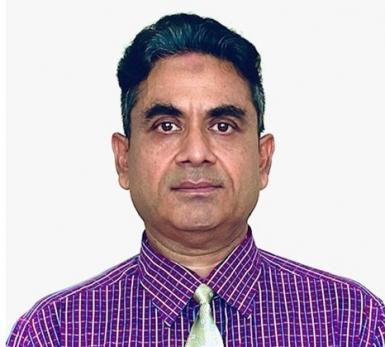Dr Monowarul Mobin Siddique
mobin.siddique@ubd.edu.bn
Associate Professor in Nutritional Biochemistry.
School of Biosciences, University of Nottingham (Malaysia Campus). 2013-2016.
Visiting Associate Professor.
Cardiovascular & Metabolic Disorders.
Duke-NUS Graduate Medical School,
National University of Singapore. (May, 2014 to September, 2014).
Lecturer for undergraduate module “Transforming Medicine: From Bench to Bedside & Beyond (FMS1201D)†in Faculty of Science, National University of Singapore, Singapore.
Lecturer.
School of Life Sciences and Chemical Technology. Ngee Ann Polytechnic. Singapore.
Senior Research Fellow.
Cardiovascular and Metabolic Disorders, Duke-NUS Graduate Medical School.
National University of Singapore. 2009-2013.
Research Scientist.
Singapore Health Services, Singapore. 2007-2009
Postdoctoral Research Fellow.
Institute of Molecular and Cell Biology. Singapore Agency for Science, Technology, and Research (A*Star). Singapore. 2006-2007.
Research Officer.
Division of Cellular and Molecular Research, National Cancer Centre of Singapore. Singapore. 2001-2006.
EDUCATION
PhD
Department of Biochemistry
National University of Singapore
RESEARCH INTERESTS
Nutritional biochemistry,
Insulin sensitivity and pro-anabolic pathways,
Autophagy and Apoptosis.
Molecular Carcinogenesis, NAFLD
FUTURE PROJECTS
Phytonutrients in protecting hepatocytes from lipid accumulation and lipid-mediated cellular damage.
NAFLD includes a spectrum of conditions associated with lipid deposition in liver cells (hepatocytes) and inability of the liver cells to respond to insulin (insulin resistance). We have shown previously that induction of autophagy can prevent accumulation of lipid droplets in the hepatocytes and improves hepatic steatosis which leads to the pathogenesis of non-alcoholic fatty liver disease (NAFLD). This project is aiming to investigate the biochemical properties of several promising polyphenols in inducing autophagy in liver cell lines along with their role on lipogenesis and insulin signalling in hepatocytes.
Applications Invited
MSc PhD
RECENT PUBLICATIONS
Chaurasia B, Kaddai VA, Lancaster GI, Henstridge DC, Sriram S, Galam DL, Gopalan V, Prakash KN, Velan SS, Bulchand S, Tsong TJ, Wang M, Siddique MM, et al. 2016. Adipocyte Ceramides Regulate Subcutaneous Adipose Browning, Inflammation, and Metabolism. Cell Metab. 24(6):820-834.
MM Siddique, Ying Li, B Chaurasia, VA Kaddai, and Scott A. Summers. 2015. Dihdyroceramides: From Bit Players to Lead Actors. J Biol Chem. 290(25):15371-9.
Jose A. Chavez, M. Mobin Siddique, Puck Wee Chan, James A. Shayman, and Scott A. Summers. 2014. Ceramides and Glucosylceramides are Independent Antagonists of Insulin Signaling. J Biol Chem. 289(2): 723-34.
M Mobin Siddique, Zhao Yi, Lim Hui Qin, Gita Krishnaswamy, Tan Eng King. 2014. Association study of p53 codon 72 polymorphism in Parkinson’s disease. Basal Ganglia. 4: 71-73.
MM Siddique, Ying Li, Liping Wang, Jianhong Ching, Mainak Mal, Olga Ilkayeva, Ya Jun Wu, Boon Huat Bay, and Scott Summers. 2013. Ablation of Dihydroceramide Desaturase-1, a therapeutic target for the treatment of metabolic diseases, simultaneously stimulates anabolic and catabolic signaling. Mol Cell Biol. 33(11): 2353-69.
MM Siddique, Benjamin T Bikman, Liping Wang, Li Ying, Erin Reinhardt, Guanghou Shui, Markus R. Wenk, and Scott A. Summers. 2012. Ablation of Dihydroceramide Desaturase Confers Resistance to Etoposide-Induced Apoptosis. PLoS ONE.7(9): e44042.
TOP PUBLICATIONS
Chaurasia B, Kaddai VA, Lancaster GI, Henstridge DC, Sriram S, Galam DL, Gopalan V, Prakash KN, Velan SS, Bulchand S, Tsong TJ, Wang M, Siddique MM, et al. 2016. Adipocyte Ceramides Regulate Subcutaneous Adipose Browning, Inflammation, and Metabolism. Cell Metab. 24(6):820-834.
MM Siddique, Ying Li, B Chaurasia, VA Kaddai, and Scott A. Summers. 2015. Dihdyroceramides: From Bit Players to Lead Actors. J Biol Chem. 290(25):15371-9.
MM Siddique, Ying Li, Liping Wang, Jianhong Ching, Mainak Mal, Olga Ilkayeva, Ya Jun Wu, Boon Huat Bay, and Scott Summers. 2013. Ablation of Dihydroceramide Desaturase-1, a therapeutic target for the treatment of metabolic diseases, simultaneously stimulates anabolic and catabolic signaling. Mol Cell Biol. 33(11): 2353-69.
MM Siddique and EK Tan. 2010. Neurochemistry changes associated with mutations in Familial Parkinson’s disease. Curr Med Chem. 17(35): 4378-91.
M Siddique and K Sabapathy. 2006. Trp53-dependent DNA-repair is affected by the codon 72 polymorphism. Oncogene. 25(25): 3489-3500.
M. Mobin Siddique and Scott A. Summers. Lipids in Human Diseases. 2012. In “Lipidomics – Technologies and Applicationsâ€. Wiley VCH Verlag GmbH & Co. Germany.
M Mobin Siddique, Zhao Yi, Lim Hui Qin, Gita Krishnaswamy, Tan Eng King. 2014. Association study of p53 codon 72 polymorphism in Parkinson’s disease. Basal Ganglia. 4: 71-73.
Siddique MM, Balram C, Fiszer-Maliszewska L, Aggarwal A, Tan A, Tan P, Soo KC, Sabapathy K. 2005. Evidence for selective expression of the p53 codon 72 polymorphs: implications in cancer development. Cancer Epidemiol Biomarkers Prev. 14(9):2245-2252.
Toh WH, Siddique MM, Boominathan L, Lin KW, Sabapathy K. 2004. c-Jun regulates the stability and activity of the p53 homologue, p73. J Biol Chem. 279(43):44713-44722.
